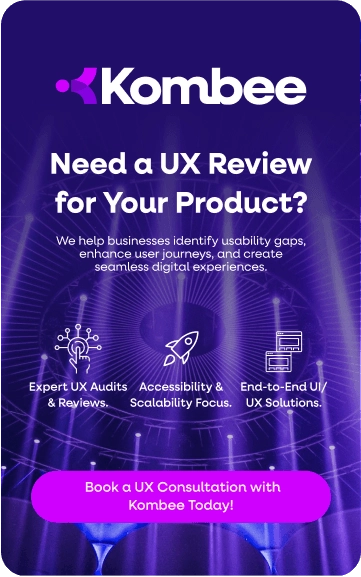Introduction
Did you know that more than 81% of shoppers research a company online before purchasing?
That's right; your website is usually your initial and sometimes your only opportunity to make a great impression. Many businesspeople ask themselves whether social media or word of mouth will suffice. But let's be real, today's customers expect better. They want to find you online, clearly, quickly and professionally.
In this blog, let's learn why your business needs a website and how directly it influences success.
Why Do Modern Businesses Need a Website to Succeed?
Your website is like owning property in a digital city, everything else is rented space that could vanish overnight, but your site is yours to build and expand.

Total Ownership and Control
You own your site. That means:
- You get to decide how it looks.
- You have control over how it works.
- You get to choose what information you gather.
With your site, you're the boss, granting you complete freedom and security.
Customization and Branding
Your website is a representation of you. Fonts, colours, design, everything is in line with your business personality. This allows you to tell your story, establish trust and provide tools.
Need help creating a branded, high-performance website that reflects your business identity? Kombee offers trusted website development tailored to your goals, whether you’re starting from scratch or upgrading an existing site.
Central Hub for Marketing
All your marketing ads, email and social media leads back to your site. It becomes the conversion hub, where interest turns into leads and leads into customers. That’s why having a website for business growth is so powerful.
The Need for a Website as the Digital Home of Your Business
A website is your business's permanent, self-owned home on the web, something different from social media, which you don't get to control. It is your virtual home, where you bring together your brand, content and customer interactions in a trusted and accessible place.
Here are some reasons why you need to have a website for your business.
1. Meeting Customer Expectation
Let's face it: if a prospective customer Googles your business and can't find any website, what does that convey? Perhaps you don't exist. Perhaps you are too small-time. Perhaps you aren't professional.
Website as a Powerful Business Asset
A well-designed website assures that you’re serious. It provides answers, builds credibility and offers potential clients with everything they need: product details, pricing, service descriptions, FAQs, reviews and contact information. These aren’t just extra features. They’re essential uses of a website that turn curiosity into conversion.
Part of Branding and Marketing Strategy
Your site is more than a brochure. It's an engine for marketing. Blog posts, case studies, lead magnets, email opt-ins and landing pages all drive business growth when placed on your site. To establish credibility and trust and to capture leads, a website is where it begins.
2. Creating Credibility and Trust
Customers buy from companies they trust and a great website establishes that trust.
Customer Expectations
Today's customers demand a secure website (HTTPS), one that is fast, mobile-friendly and informative. It's not nice to have its minimum requirement. And if you're wondering once more, "Do I need a website for my business?" consider this: would you trust a company that doesn't even have one?
Showcasing Authority
Sites also enable you to share what qualifies you as an expert. You can blog, post certifications and showcase press mentions. These pieces of content build your authority and bolster why individuals need to pick you over the competition.
Competitive Advantage
Most of your competitors already have websites. If you don't, then you're letting them get a jumpstart. A quicker, clearer, more useful website tends to be the difference between a lost lead and a loyal client. And that's one of the reasons websites are necessary for businesses that need websites to compete with others in crowded markets.
3. SEO and Organic Traffic as a Long-Term Strategy
If you're not appearing on Google, you're losing out. A website enables you to compete for search and draw in individuals who are actively searching for what you have to offer.
- Increased Search Rankings: With good SEO your site appears higher in search results ahead of your customers when they are ready to purchase.
- Evergreen Content: Unlike social media, blog posts and landing pages on your site remain searchable and valuable for years. Long-term traffic is one of the best applications for a website.
- Local SEO Benefits: If you have a physical location or serve a geographic region, local SEO allows your business to appear in map listings and "near me" searches driving real, local customers.
- Decreasing Ad Dependence on Paid Media: SEO lessens the amount you spend on advertising by establishing steady organic traffic. That's a huge benefit to your bottom line and another good reason why your business needs a website.
4. First-Party Data Ownership and CRM
Your website provides you with first-party access to customer activity without having to rely upon a third party.
- Data Collection: Utilising analytics tools like Google Analytics or Meta Pixel you can track who visits, what they do and which content is most effective. All this fuels informed decisions.
- Personalized Marketing: With the data in your control, you can create personalized email campaigns, make product recommendations or send targeted offers. That's the type of customer experience that grows your business.
- Forging Loyalty: Customer accounts, special promotions and valuable content bring back visitors. These tools of loyalty are strongest when maintained on a site that belongs to you.
5. Direct Sales and Greater Profit Margins
Marketplaces such as Amazon or Etsy charge a commission. Selling directly from your site means you retain more of what you make.
Avoiding Platform Fees
Selling on marketplaces can be easy, but with every sale comes a price tag. They cut you in, sometimes deeper than you anticipate. When you sell from your site, you don't pay all those extra charges. You make the sale and you retain the profit. It's easy and it adds up quickly.
Control Over Policies and Pricing
Your site places you in charge of the way you do business. You set prices, discounts, returns and shipping not someone else. You can create a flash sale or offer free shipping at any time. You don't have this type of freedom when you are stuck with another company's rules.
Better Conversion Rates
Your site can be tailored to your audience. Simple design, clear navigation and quick checkout are all that make it simpler for consumers to say "yes." You can even incorporate upsells, bundles or reminders to increase the value of every order. That's the level of control that gives you improved outcomes.
Case Study: Kombee partnered with Save More to build a powerful retail site. The result? Easier inventory updates, a store locator, mobile optimization, and improved customer engagement. A perfect example of how the right website can directly impact sales and efficiency.
6. Enhancing Customer Service and Internal Efficiency
Your site can sell more than that. It can assist your staff and benefit your customers simultaneously. As you concentrate on operating the business, your site is making money behind your back.
24/7 Access to Information
Your customers don't have time to wait. They need answers immediately. A good site provides them with what they're looking for, whether it's product information, hours, booking links or policies. It's all there for them anytime they check, even at 3 a.m.
As Paul Cookson, National Reading Hero and Poet, said, “Websites promote you 24/7: No employee will do that.” This nonstop presence builds trust and keeps your business working even when you’re off the clock.
Lowering Support Calls
If you answer standard questions correctly on your website via FAQs, product manuals or instant chat options, individuals don't need to call or email. That saves your time and minimizes stress on your team.
Improved Customer Experience
The more convenient you make it for customers to obtain what they require, the higher their return rate will be. Functions such as real-time chat support, ticketing or order tracking make the process easy, demonstrating your business's concern for service.
Employing Websites and Social Media Simultaneously for Improved Performance
You don't need to choose between your website and social media. The best outcome occurs when you use them in conjunction with each other. Social media generates awareness. Your website converts that awareness into action.
Driving Traffic
Consider social media your billboard. That's where you get noticed. But when someone wants to know more or make a purchase, where do they go? Your website. That's where the real action occurs.
Website as Conversion Hub
When visitors arrive on your site, they're ready to act. Whether they're signing up, purchasing or making a reservation, your site is where decisions are made. That's why a website isn't just beneficial. It's necessary.
A Starting Point for Successful Digital Marketing
Without a website, your marketing is fragmented. With one, everything is more effective.
Platform for Ads
Each ad you place, whether on Google, Facebook or elsewhere, must lead back to your website. That's where clicks are converted into conversions. A good landing page makes your ad expenditure worthwhile.
Want to avoid the common pitfalls that lead to e-commerce failure? Read our blog: Why 80% of E-commerce Websites Fail (And How Yours Won’t!) to learn how to future-proof your online store from day one.
Historic Data Benefits
The longer your website is up, the more you know. You can view what pages people go to, what they click on and where they drop off. That type of visibility makes you a better version of yourself better at crafting messages and products.
Early Setup Advantage
The sooner you have your website up and running, the better. Search engines begin to track it. Customers begin to use it. You begin to establish a true digital presence. Delay only allows others a head start.
Conclusion
Let's get back to basics. The value of a website extends well beyond "just being online." It establishes trust, drives traffic, gathers data, sells products and builds your business all in one location.
So if you're still asking yourself whether or not you need a site for your business the answer is simple, yes you do. Need help with developing a website? Don’t worry, Kombee is here to help you build the perfect digital home for your business.
Frequently Asked Questions
1. Why do I still need a website if I sell on social media?
A website gives your business credibility, control, and a centralized platform to showcase products and services. Unlike social media, it's not subject to algorithm changes or platform restrictions. It also allows for better tracking, analytics, and customer experience, helping you convert traffic into long-term, loyal customers.
2. How does a website help with local customers?
A website optimized for local SEO helps your business appear in local search results, Google Maps, and “near me” searches. It provides essential information like address, hours, and reviews, making it easy for nearby customers to find and contact you, increasing walk-ins and local service inquiries.
3. Is it expensive to maintain a website?
Website maintenance is generally affordable. Costs can vary based on domain registration, hosting, and occasional updates. The ROI from increased visibility and credibility often far outweighs the minimal ongoing investment. It’s a small investment compared to the value it adds long-term.
4. What role does a website play in digital marketing and SEO?
A website is the foundation of digital marketing. It enables SEO to improve search engine rankings, supports paid ad campaigns, collects leads, and tracks user behavior. It acts as a 24/7 marketing tool, converting traffic from various digital channels into measurable business results.






